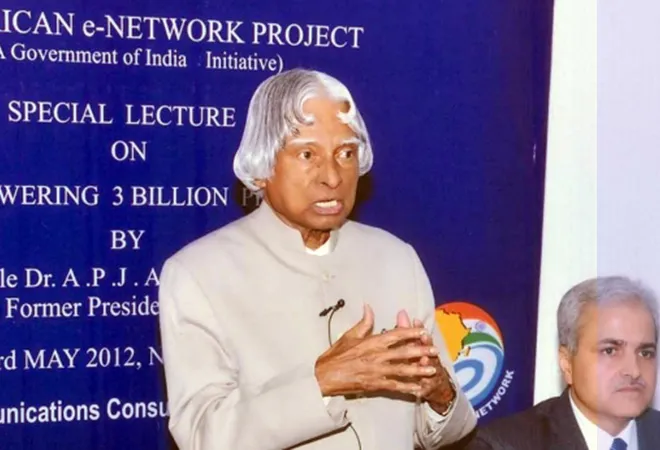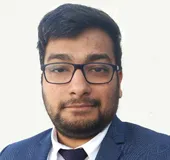
Since the first India-Africa Forum Summit in 2008, India’s development cooperation initiatives with the countries of African continent have been steadily growing. In more recent years, the scope and extent of collaborative projects with individual countries as well as on a pan-African basis has seen a quantum jump. Participation of 41 Heads of State, Government and representatives of African countries in the third Forum Summit held in October 2015 in New Delhi attested to the growing synergy in India-Africa ties. In this backdrop, the significance of Pan African e-network (PAeN) on Tele-Education and Tele-Medicine may be appreciated.
The project was conceived by former President of India APJ Abdul Kalam during his inaugural address to the Pan African Parliament in Johannesburg in September 2004. It was intended to provide ‘seamless’ and ‘integrated’ satellite , fiber optics and wireless network to connect the African countries. The project aimed at creating significant linkages for tele-education and tele-medicine, internet, video conferencing, and VoIP services by linking them to premier educational institutions and super-specialty hospitals in India. The project also supports e-governance, e-commerce, infotainment, resource mapping and meteorological services.
The project is a joint undertaking of the Government of India and the African Union (AU) High Commission. India’s Ministry of External Affairs is the designated nodal Ministry and The Department of Space and Telecommunications Consultants India Limited (TCIL) is the implementing agency of the project. The participating institutions are connected, through optical fiber links, to a Data Center at TCIL Bhawan, New Delhi, and then to the African satellite hub earth station in Dakar, Senegal. The project has two main components: Tele-Education Services and Tele-Medicine Services.
Under the project, integrated tele-education delivery system software has been provided to bring virtual remote classrooms in a multi-studio and multi-class environment with seamless two-way interaction between teachers and students through collaborative tools. Tele-education teaching centers have been set up in five Indian Universities: Amity University, Indira Gandhi National Open University, BITS Pilani, University of Delhi, and University of Madras. There are a total of 47 Learning Centers (LC) already set up and involves 5 Regional University Centers in Africa, namely; Kwame Nkrumah University of Science and Technology, Ghana; Makerere University, Uganda; Yaounde University, Cameroon; Alexandria Faculty of Commerce, Egypt; and in Chancellor College, Malawi.
The tele-medicine system consists of customized medical software for patient demographics and workflow for tele-advice. It helps to record the medical record/history of patients which are captured and stored in the servers. These are then sent to specialist doctors in India, who in turn study and provide diagnosis and treatment during live Tele-interactions with their counterparts in African countries.
In India, patient end locations have been set up in 12 Indian super specialty hospitals including at AIIMS, New Delhi. These super specialty hospitals are connected to the 48 Patient end locations/ hospitals in African countries. Tele-medicine centers have been set up in five regional super specialty hospitals in Nigeria, Republic of Congo, Mauritius, Egypt and Senegal. These super specialty hospitals also conduct regular Continuing Medical Education (CME) to help train doctors and nurses in remote centers in Africa.
Since the launch of the PAeN project in 2009, the participating member states have made no contribution to the budget and operational costs of the project.
Consequently, in July 2017, the Government of India discontinued all the services provided through the network and handed it over to the AU Commission. The AU Commission then placed the network hub in Dakar’s suburban area under the custody of the Government of Senegal.
It is noteworthy that the participating member states were not required to contribute to the budget and operational costs of the PAeN project. This unique offering by India to positively contribute and impact the social development of the African countries constitutes a qualitative dimension to India’s approach and outreach to Africa.
On 30 March 2018, the chairman of the African Union (AU) presented the progress report in respect of PAeN project. The report highlighted the background, achievements, and challenges of the project and provided few recommendations. The AU Commission has undertaken a number of actions at several levels not only to avoid interruption of services (caused mainly by armed conflict), but also to extend the network all over the continent. The expanded services include AU Continental Mass Education TV (CMETV) and opening the PAeN to other service providers in the world.
As of March 2017, under the PAeN project,
- 22,000 students obtained degrees in various graduate and under graduate disciplines from various Indian universities through the network ,
- 770 tele-medicines consultations and tele-expertise sessions were carried out annually
- 6,700 Continuous Medical Education (CME) sessions were held for doctors and nurses.
- List of add-on services by the PAeN infrastructure includes a pre-feasibility study on Continental Mass Education TV (CMETV), setting up of a Pan-African University and setting up of African Virtual (e-) University.
In 2014, the AU Assembly had requested the AU Commission to prepare an action plan for the sustainability of the services of the network. A study commissioned to develop an action plan for the purpose, the ‘PAeN Sustainability Action Plan’, aimed to encourage the participating member states to subsidize the Operation and Maintenance (O&M) of the network to a cooperative entity, and contribute to the financing and implementation of the project.
Subsequently, a meeting of the Assembly of Users of the Pan African e-Network (PAeN) and Bureau of the Specialized Technical Committee on Communication & Information & Communication Technology (STC-CICT) was convened on 26 April, 2016. The meeting approved the proposed scheme for the continuity and sustainability of the services of the network. The meeting decided that the implementation of the transfer will be carried out following a transitional period to allow for a smooth handover.
Current ongoing activities under the project:
The ongoing activities under the project includes a comprehensive evaluation of:
- Management Structure for Operations and Maintenance (O&M)
- Funding mechanism
- Fees of the services
- Revenue flows
- Survey by participating states to access the utilization of the PAeN
- Link PAeN with AUC/HRST African e-/Virtual University
- Working towards a Pan African University
Governance structure of the PAeN:
Following the transfer of ownership to African parties, the main governance structures for Operations and Maintenance (O&M) will include:
- The Assembly of Users as the highest organ to govern the network
- The PAeN Oversight Committee (POC) – its main purpose is to give general policy directions and governance for the activities of the PAeN sustainability
- The PAeN Management Cooperative Entity
Major issues/challenges:
- The foremost challenge for the PAeN project is the lack of strong commitment by participating members to allocate resources to ensure the sustainability of the network.
- Follow up with users in order to build a very strong pan-African Tele-Education and Tele-Medicine network open to the whole world rather than limited to the African continent
- There’s a need to diversify the content and languages by including other African Union official languages such as French, Arabic, Portuguese
Current status of the project and India’s role:
African countries have received and welcomed the project with much enthusiasm. The project is keenly observed by Africa watchers as an example of the kind of initiative Africa needs to empower its people and aid Africa’s journey towards achieving Sustainable Development Goals (SDG) targets, especially in education and health sector.
Therefore, the Government of India has proposed to extend the technical and financial assistance for the project for five more years.
To this end, both the PAeN Oversight Committee (POC) and the Assembly of Users is continuing to assess the utilization of the project by participating members. Therefore, the African Union Commission (AUC) needs to consult with the participating African countries in order to ascertain their collective response to the offer made by the government to further extend the services of project.
Hence, if agreed by the Assembly of Users of PAeN, Indian expertise would still continue to be involved in the project.
Given the success of and wide appreciation for the PAeN project, there is no reason to believe that African nation’s would reject India’s offer for extension of the project.
Restoring the operations of the project will clearly demonstrate African Union’s capacity and will to manage and sustain the project.
Ultimately, as stated by Dr.Kalam, the central focus for the PAeN is to build bridges between all African tele-centers in order to forge a synergy of learning experiences as ‘knowledge shared is knowledge multiplied’ between India and Africa.
The views expressed above belong to the author(s). ORF research and analyses now available on Telegram! Click here to access our curated content — blogs, longforms and interviews.




 PREV
PREV


